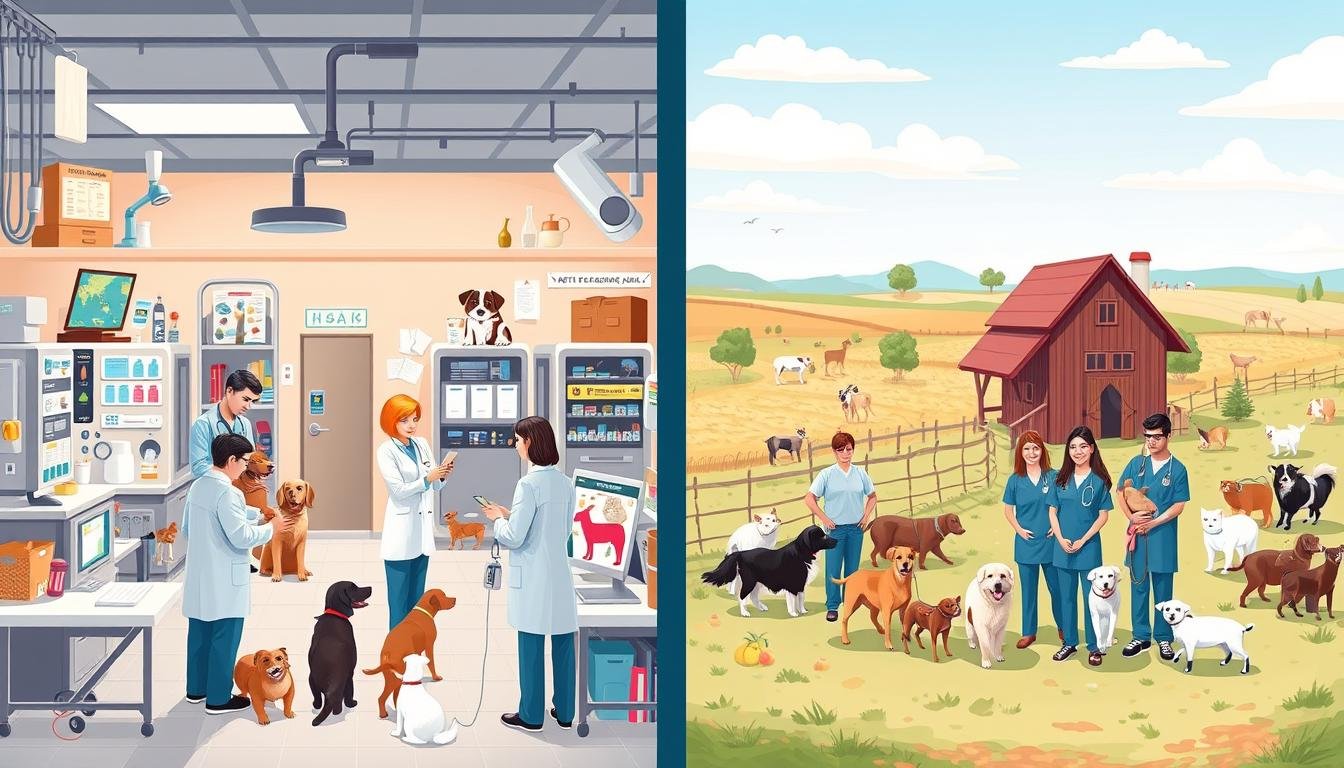Vet techs play a crucial role in animal healthcare. They support vets and ensure pets’ well-being.
This guide explores vet tech salaries in 2024. We’ll look at national averages and regional differences.
A serene veterinary clinic setting featuring a vet tech interacting gently with various animals, showcasing a mix of small and large pets, surrounded by medical equipment and charts displaying salary statistics, a warm and professional atmosphere, natural light filtering through windows, detailed textures of fur and instruments.
Vet techs assist with patient care and lab work. They also educate clients and handle admin tasks.
Knowing earning potential helps vet techs plan their careers. It aids in making informed decisions about professional growth.
Understanding the Role of a Vet Tech
Vet techs are key players in animal healthcare. They help vets and care for animals in many ways.
Vet techs assist during exams and surgeries. They also do lab work and give medicines to animals.
Vet techs need to know about animal bodies and medical terms. They must be good at handling animals safely.
Good people skills are essential for vet techs. They talk to pet owners and work with the vet team.
Vet techs must love animals and be patient. They teach pet owners how to care for their pets.
This job is excellent for people who want to help animals. It offers many chances to learn and grow.
Factors Influencing Vet Tech Salaries
Vet tech salaries vary based on several factors. Location plays a significant role in how much they earn.
Urban areas often pay more than rural ones. Experience matters, too, with seasoned pros earning more.
The employer type affects pay as well. Private practices may offer less than larger institutions.
Animal hospitals and research facilities often pay more. Specialized skills can boost earning potential.
Vet tech salary factors help guide career decisions. Understanding these can lead to better pay negotiations.
Considering these factors can lead to a stable future. It helps vet techs thrive in veterinary medicine.
Average Salary of a Vet Tech in 2024
Vet tech salaries in the US are expected to increase in 2024. The national average is projected to reach around $36,000 per year.
Salaries vary by state. California, New York, and Alaska offer the highest pay, up to $45,000 annually.
Mississippi, Arkansas, and Oklahoma have lower salaries, ranging from $30,000 to $34,000 yearly.
Salary differences depend on the cost of living and demand for vet services. Staying informed about salary trends helps vet techs make smart career choices.
Comparing Vet Tech Salaries by Experience Level
Vet tech salaries typically increase with experience. Let’s explore how earnings grow throughout a vet tech’s career.
Entry-level vet techs earn about $35,000 to $40,000 yearly. They assist vets with routine tasks like exams and lab work.
Mid-career vet techs can earn $40,000 to $50,000 annually. They may train new staff or specialize in specific areas.
Senior-level vet techs can make $50,000 to $60,000 per year. They often manage practices or perform advanced procedures.
Vet tech careers offer rewarding salary growth. As skills improve, earning potential steadily increases over time.
Benefits and Compensation Beyond Salary
Veterinary technician compensation includes more than just yearly pay. A complete benefits package is a key part of the overall pay.
Many vet techs prioritize good health insurance coverage. Employers often provide medical, dental, and vision plans for their staff.
Retirement savings options help vet techs plan for their future. Continuing education support can boost skills and career growth.
Some employers offer extra perks like paid time off. Employee discounts and flexible schedules can also improve job satisfaction.
When looking at vet tech jobs, think about the whole package. Consider all benefits, not just the base salary.
Salary Expectations in Urban vs. Rural Settings
Location dramatically affects vet tech salaries. Urban and rural areas have different pay scales for veterinary technicians.
Urban vet tech pay is usually higher. Cities have more pet owners, increasing demand for veterinary services.
Urban living costs more. Employers offer higher wages to attract qualified staff.
Rural veterinary technician earnings may be lower. A smaller client base means less demand for services.
Rural areas have lower living costs. This can balance out the lower salaries.
A split-scene illustration depicting a bustling urban veterinary clinic with high-tech equipment and a diverse team of vet techs interacting with various pets, contrasted with a serene rural veterinary practice surrounded by fields and animals, showcasing a minor team of vet techs in a cozy setting, emphasizing the differences in environment and atmosphere.
Rural vet techs may enjoy a relaxed work-life balance. They often work in closer-knit communities.
Consider more than just salary when choosing a location. Look at quality of life and career growth opportunities.
Research the job market in your preferred area. Weigh the pros and cons of each setting.

Certification and Its Impact on Salary
Vet tech certification can boost your earning potential. Certified technicians often earn more than non-certified ones.
Credentials like CVT or RVT show your expertise. They also demonstrate your commitment to professional growth.
Additional certifications can further increase your salary. Consider specializing in anesthesia, dentistry, or emergency care.
Certification offers more than just higher pay. It can lead to better job opportunities and more autonomy.
Certified professionals gain respect from colleagues and clients. They show dedication to providing top-notch animal care.
Investing in certification is investing in your future. It positions you for long-term success in this field.
Career Advancement Opportunities for Vet Techs
Vet techs have many chances to grow in their careers. You can move up to management or focus on a unique area.
Getting extra certifications can help you advance. You can learn about anesthesia, emergency care, or dentistry.
Some vet techs become practice managers or lead techs. These jobs involve running the clinic and leading the team.
You could also teach at schools. This way, you can share what you know with new vet techs.
Salary Trends Over the Years
Vet tech salaries have changed a lot over time. They’ve gone up due to more demand for animal care.
In 2024, the average vet tech salary is expected to be $36,280. This is higher than in past years.
The job market for vet techs looks good. It’s growing faster than many other jobs.
Where you live affects how much you can earn. Your experience and special skills matter, too.
Vet techs who keep learning new things can make more money. The future looks bright for this field.
Job Outlook for Vet Techs
Vet tech jobs are growing fast. The demand for these professionals is rising quicker than other jobs.
More people are getting pets these days. This means more vet techs are needed to help care for animals.
New advances in animal care are also creating more jobs. Preventive care is becoming more critical, too.
The Bureau of Labor Statistics predicts a 15% growth in vet tech jobs. This is much higher than the 5% average for all jobs.
Thousands of new vet tech positions will open up. This field offers many exciting career options.
Vet techs can work in clinics, hospitals, and other places. Staying updated on trends can lead to a rewarding career.
Part-Time vs. Full-Time Vet Tech Salaries
Vet tech salaries differ between part-time and full-time jobs. Part-time roles often pay hourly, with overtime for extra work.
Full-time positions usually offer yearly salaries. This can provide a more stable income for vet techs.
Part-time work may offer more schedule flexibility. However, it might have fewer benefits than full-time positions.
Full-time jobs often include health insurance and retirement plans. They may also provide paid time off.
Your choice depends on your personal needs. Part-time work suits those wanting flexibility or extra income.
Full-time roles offer job security and growth chances. Consider your situation when choosing between part-time and full-time work.
Tips for Maximizing Your Vet Tech Salary
Vet techs deserve fair pay for their hard work. Here are strategies to boost your earnings and increase your earning potential.
Become a skilled salary negotiator. Research the average pay for your position and location.
Use this info to advocate for competitive pay. Show your value through accomplishments and qualifications.
Invest in your professional development. Get specialized certifications or licenses beyond core vet tech training.
Expand your skillset to be more valuable. Consider certifications in phlebotomy, animal dentistry, or emergency care.
FAQ
What is the average salary for a vet tech?
Vet techs in the US earn between $35,000 to $45,000 yearly. Pay varies based on location, experience, and certification.
What skills are essential for a vet tech?
Vet techs need technical knowledge and animal handling expertise. They also need strong communication skills and attention to detail.
What factors influence vet tech salaries?
Location, experience, and employer type affect vet tech pay. Certifications and specializations also impact salaries.
How do vet tech salaries compare across different states?
Vet tech salaries vary by state. California, New York, and Washington often pay more than rural states.
How does experience affect vet tech salaries?
Entry-level vet techs start at $30,000 to $35,000 yearly. Senior-level techs can earn $40,000 to $50,000 or more.
What benefits do vet techs receive beyond their base salary?
Vet techs often get health insurance and retirement plans. They may also receive paid time off and continuing education chances.
Are there differences in salary between urban and rural vet tech positions?
Urban areas typically offer higher pay but higher living costs. Rural positions may have lower salaries but cheaper living expenses.
How does certification impact a vet tech’s salary?
Certified vet techs often earn more. The Certified Veterinary Technician (CVT) credential can boost pay.
What career advancement opportunities are available for vet techs?
Vet techs can specialize in areas like anesthesia or emergency care. They may also move into management roles with higher pay.
How have vet tech salaries changed over the years?
Vet tech salaries have increased due to growing demand. Industry projections suggest continued salary growth in coming years.
What is the job outlook for vet techs?
The job outlook for vet techs is very positive. The field is expected to grow 15% over the next decade.
How do part-time and full-time vet tech salaries compare?
Part-time vet techs typically earn less per hour. Full-time techs get better benefits and can earn higher yearly pay.
How can vet techs maximize their salaries?
Vet techs can boost pay through certifications and special skills. They should also negotiate salaries and review pay regularly.
You may also read: Tech Priest: The Digital Clergy of Machine Worship
